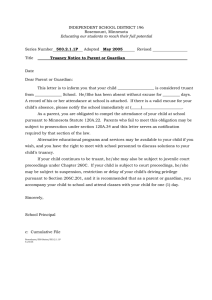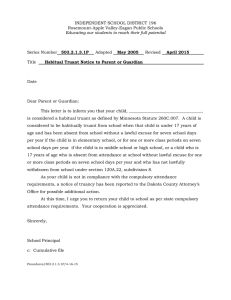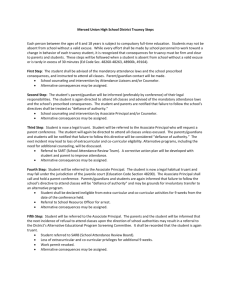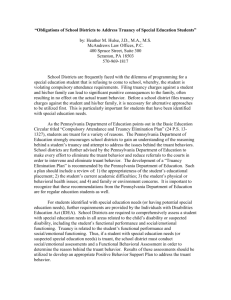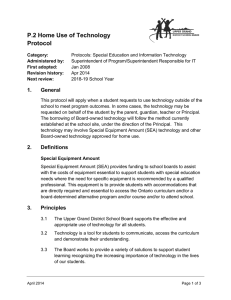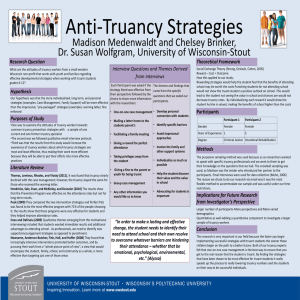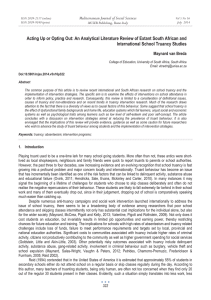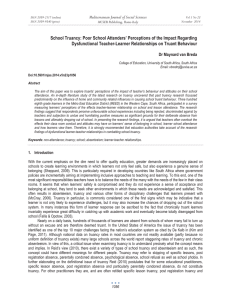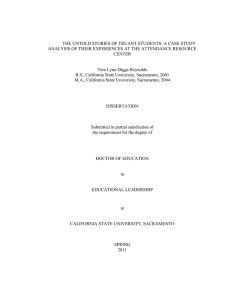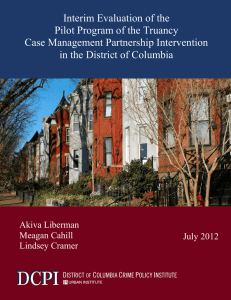Students
advertisement
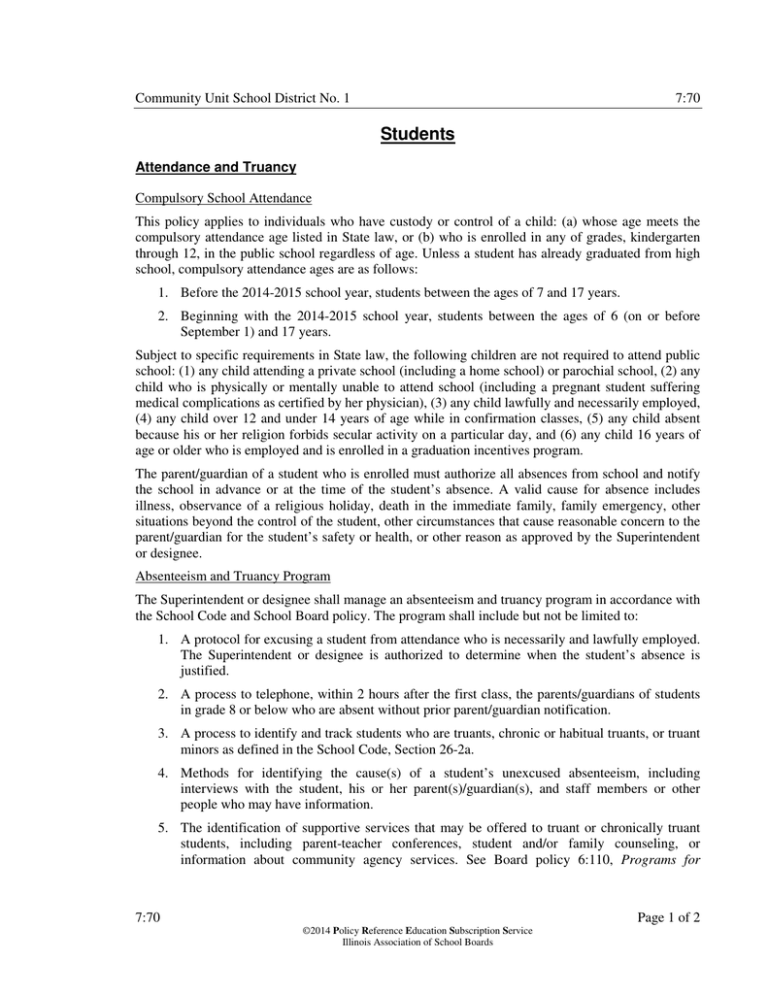
Community Unit School District No. 1 7:70 Students Attendance and Truancy Compulsory School Attendance This policy applies to individuals who have custody or control of a child: (a) whose age meets the compulsory attendance age listed in State law, or (b) who is enrolled in any of grades, kindergarten through 12, in the public school regardless of age. Unless a student has already graduated from high school, compulsory attendance ages are as follows: 1. Before the 2014-2015 school year, students between the ages of 7 and 17 years. 2. Beginning with the 2014-2015 school year, students between the ages of 6 (on or before September 1) and 17 years. Subject to specific requirements in State law, the following children are not required to attend public school: (1) any child attending a private school (including a home school) or parochial school, (2) any child who is physically or mentally unable to attend school (including a pregnant student suffering medical complications as certified by her physician), (3) any child lawfully and necessarily employed, (4) any child over 12 and under 14 years of age while in confirmation classes, (5) any child absent because his or her religion forbids secular activity on a particular day, and (6) any child 16 years of age or older who is employed and is enrolled in a graduation incentives program. The parent/guardian of a student who is enrolled must authorize all absences from school and notify the school in advance or at the time of the student’s absence. A valid cause for absence includes illness, observance of a religious holiday, death in the immediate family, family emergency, other situations beyond the control of the student, other circumstances that cause reasonable concern to the parent/guardian for the student’s safety or health, or other reason as approved by the Superintendent or designee. Absenteeism and Truancy Program The Superintendent or designee shall manage an absenteeism and truancy program in accordance with the School Code and School Board policy. The program shall include but not be limited to: 1. A protocol for excusing a student from attendance who is necessarily and lawfully employed. The Superintendent or designee is authorized to determine when the student’s absence is justified. 2. A process to telephone, within 2 hours after the first class, the parents/guardians of students in grade 8 or below who are absent without prior parent/guardian notification. 3. A process to identify and track students who are truants, chronic or habitual truants, or truant minors as defined in the School Code, Section 26-2a. 4. Methods for identifying the cause(s) of a student’s unexcused absenteeism, including interviews with the student, his or her parent(s)/guardian(s), and staff members or other people who may have information. 5. The identification of supportive services that may be offered to truant or chronically truant students, including parent-teacher conferences, student and/or family counseling, or information about community agency services. See Board policy 6:110, Programs for 7:70 Page 1 of 2 ©2014 Policy Reference Education Subscription Service Illinois Association of School Boards Students At Risk of Academic Failure and/or Dropping Out of School and Graduation Incentives Program. 6. A process to request the assistance and resources of outside agencies, such as, the juvenile officer of the local police department or the truant office of the appropriate Regional Office of Education, if truancy continues after supportive services have been offered. 7. A protocol for cooperating with non-District agencies including County or municipal authorities, the Regional Superintendent, truant officers, the Community Truancy Review Board, and a comprehensive community based youth service agency. Any disclosure of school student records must be consistent with Board policy 7:340, Student Records, as well as State and federal law concerning school student records. 8. An acknowledgement that no punitive action, including out-of-school suspensions, expulsions, or court action, shall be taken against a chronic truant for his or her truancy unless available supportive services and other school resources have been provided to the student. 9. The criteria to determine whether a student’s non-attendance is due to extraordinary circumstances shall include economic or medical necessity or family hardship and such other criteria that the Superintendent believes qualifies. [For high school and unit districts only] 10. A process for a 17 year old resident to participate in the District’s various programs and resources for truants. The student must provide documentation of his/her dropout status for the previous 6 months. A request from an individual 19 years of age or older to re-enroll after having dropped out of school is handled according to provisions in 7:50, Students School Admissions and Student Transfers To and From Non-District Schools. 11. A process for the temporary exclusion of a student 17 years of age or older for failing to meet minimum academic or attendance standards according to provisions in State law. A parent/guardian has the right to appeal a decision to exclude a student. LEGAL REF.: 105 ILCS 5/26-1 through 16. 705 ILCS 405/3-33.5. 23 Ill.Admin.Code §§1.242 and 1.290. CROSS REF.: 6:110 (Programs for Students At Risk of Academic Failure and/or Dropping Out of School and Graduation Incentives Program), 6:150 (Home and Hospital Instruction), 7:10 (Equal Educational Opportunities), 7:50 (School Admissions and Student Transfers To and From Non-District Schools), 7:60 (Residence), 7:80 (Release Time for Religious Instruction/Observance), 7:190 (Student Discipline), 7:340 (Student Records) ADOPTED: February 18, 2015 7:70 Page 2 of 2 ©2014 Policy Reference Education Subscription Service Illinois Association of School Boards
